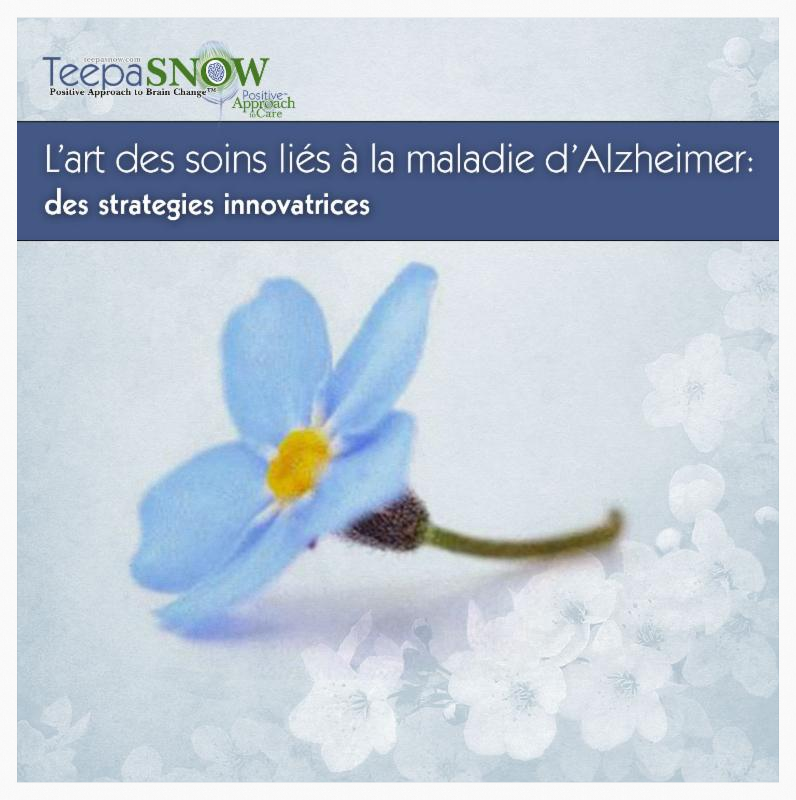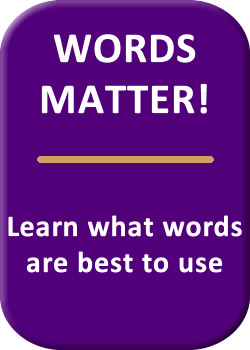
TODAY'S VOICE FOR DEMENTIA
Teepa is an advocate for those living with dementia and has made it her personal mission to help families and professionals better understand how it feels to be living with dementia related challenges and change. Her company, Positive Approach, LLC was founded in 2005 and offers education to family and professional care partners all over the world. Her goal? Making a difference...one mind at a time.
|

World Perspective: Words Do Matter
by Teepa Snow, MS, OTR/L, FAOTA
We Can Only Use What We Know
Around the world, awareness and interest are building in dementia, especially in its most widely known form, Alzheimer's Disease. The conversation around dementia is joined by newcomers, they seem to bring a good bit of baggage and history, as well as misinformation. For those of us who have been active in the lives of people living with dementia and their care partners, it can be challenging to respond and not react to statements and points of view that seem archaic or judgmental.
When people refer to those living with dementia as a demented person, sufferer, or a living vegetable I want to shake my head in frustration. On top of that, I often hear phrases such as "It's the family caregivers who really suffer, the person with dementia doesn't even know what's happening" or "has yours gotten to the violent stage yet? They all do." Some people try to dismiss the warning signs of dementia, saying "she's just pleasantly confused."
All of these labels and phrases cause my amygdala (my primitive survival - Fight/Flight/Fright) to go on HIGH alert and I want to react! Instead, I pause and take deep cleansing breaths, reminding myself that in order to respond and be effective, I need to fully understand their perspective and point of view. Only then can I connect and guide them to new possibilities (awareness), new ways of thinking (knowledge), and new ways of speaking and acting (skills) to help change what is to what is possible.
Each time I interact with a person living with any form of neurocognitive change (dementia) or stressed out care providers and family members, I prepare myself for the conversation. In the same way, I try to use reflective and supportive communication strategies in all my conversations so that I can help people grow and learn in a way that is meaningful to them. When we are first exposed to a new situation we tend to fall back on the limited advice we have seen or heard in the past.
Statement from a well-meaning political leader:
"Since pretty much all demented people will become violent at some point and need professional care on locked units, I am in support of guidelines and regulations that allow family members to fast track placements to make it easier for everyone involved."
 I try to actively listen, to use reflective and supportive communication strategies to explore more completely what they 'mean' when they make such statements. Where have they come from to get to these beliefs and attitudes? Who has shaped their thinking and actions? As the other person is talking and sharing, I encourage myself to be truly curious about them and their position. My response goes something like this:
"Sounds like you are really concerned about the welfare and care of the people in your district, and you are committed to helping them. Tell me about the 'violence' that would trigger the 'fast track' to placement..."
I try to explore all the pieces of the statement, the idea and beliefs they offer. I want to appreciate why that speaker thinks what they think, why they say what they say, what they want to do. When I think and feel I 'get them', I typically offer a summarizing statement or comment that involves both an emotional but also factual piece that pulls together all the data they offered to me. My goal is to make sure I get their point of view and that they know that I get it.
This is equally important when listening to a family caregiver who needs a chance to process what has happened to them.
Responding to a family caregiver:
"Wow, sounds like your mom had a really hard time trying to take care of your dad. It must have been one of the hardest things in the world to be trying to deal with him being in jail for domestic abuse, while you were getting your mom treated for a broken arm. And then to find out she'd broken her arm before and didn't want the neighbors to know. Flying in like that from out of town on a Friday afternoon! I hate that you had to go through all that alone and unsupported.
And then getting push-back from the legal system regarding her dementia - I can't imagine what that did to you and your parents!"
When I offer this, I am prepared to help the person GRIEVE - to move from a state of denial (it's about my own experience - not just about others), through anger (I hate what happened, how and why it happened), across bargaining (typically trying to apply a quick fix - one that won't actually work), and sadness (allowing the person to let go of bargaining/anger/denial and move on). The ultimate goal of the grieving process is acceptance, and after truly listening, I can acknowledge that it is HARD.
Bottom line for me. Words do matter! What is said, and just as importantly, how and why it is said are crucial!
Daughter of a parent in early stage dementia:
"It was one of the worse nights of my life! My dad hated me! My mom hated me! I had just flown in after getting emergency calls from the hospital, and dad at the jail. I had no idea it had gotten that bad. I had major commitments on Monday and all I was getting was push back and resistance. It just about broke me! This shouldn't happen to people. It's just not right".
My response:
"I absolutely agree, this situation shouldn't happen to anyone! No one should go through this, like that! Not you, your mom, or your dad!"
Then and only then, will I be able to offer some NEW idea or option.
"So what do you think might have been different if your dad's changing abilities had been picked up and documented by his health care provider? What if your mom had gotten some support and guidance on how to work with him and the changes in his independence?"
I then pause and allow for feedback.
"I'm just wondering if some of the violence could have been avoided if the driving issue had been addressed earlier and by someone other than your mom. Imagine having driven all your life and suddenly being confronted about your ability to drive? I'm guessing they were on their way out, and she was trying to keep him from driving."
For those of us who live with dementia in our lives, but as far as we know, not in our brains, we will always have the option to CHOOSE - try to build a bridge and invite those on the 'other side' across, or to build a wall to keep them out. Which will it be? When we are proactive rather than reactive we can respond appropriately and help our loved ones before and during their transitions.
For those who live with dementia inside, the choice is not always available, and pain and 'threat' of words can cause immediate reactions that can be strong and overwhelming. In those moments of great frustration, distress, fear, anger, it is essential that those who are able, use awareness, knowledge, and skill to connect, to reflect, to explore, and then if needed and invited, help deliver messages so that both parties can talk with one another, not just at one another.
The goal is to appreciate each person's perspective, so that there is a possibility and we can all move forward in a more mutually beneficial way, becoming a world united rather than divided. Because, until there is a cure there is care! And how we deliver care matters to each and every one of us, wherever our home is throughout the world.
|
|

Video Spotlight: L'art des soins li?s ? la maladie d'Alzheimer: des strategies innovatrices

Teepa's training is now
available in French
Produced by the Alzheimer Society Montreal, renowned dementia care expert, Teepa Snow, teaches how a person with dementia perceives the world and how care partners can change and adapt their own behavior to improve communication and quality of life for everyone involved. This french dubbed 5 hour training offers profound insight into person-centered care techniques that professionals and family members can use to "make a difference." Note: This title is not available in English.
? l'invitation de la Soci?t? Alzheimer de Montr?al, Teepa Snow, r?put?e sp?cialiste des troubles cognitifs, montre comment les personnes atteintes per?oivent le monde ainsi que comment les proches aidants et les professionnels de la sant? peuvent adapter leur approche pour favoriser une meilleure communication et am?liorer la qualit? de vie de chacun. Interpr?t?e en fran?ais, cette formation de cinq heures examine en profondeur les techniques de soins centr?s sur la personne.
Fond?e en 1981, la Soci?t? Alzheimer de Montr?al est un organisme ? but non lucratif qui vise ? all?ger les cons?quences sociales et personnelles de la maladie d'Alzheimer et des maladies apparent?es ainsi qu'? promouvoir la recherche de leurs causes et de leur traitement.
Visit the Care Store to order this DVD and other training tools.
|

Positive Partner: The Pines of Sarasota's Education
Institute
by Joann Westbrook, Director of Education
During my 20 years as a Nursing Home and Assisted Living Administrator I witnessed, first hand, the dire need for quality dementia training and Geriatric care classes. That's why, in 2007, I created the
Pines Education Institute to help the families and staff struggling with the demands of caring for someone with this disease. Partnering with professors and doctors, I developed training modules in the area of dementia and Parkinson's disease.
The following year, I saw Teepa Snow for the first time at the
Florida Health Care Association (FHCA) Conference. I was so impressed with her approach, knowledge and presentation style that I asked her to come to speak in Sarasota. When she did, the audience was blown away by her no-nonsense, yet immensely kind and effective caregiving skills. They responded overwhelmingly with gratitude and a desire to learn more.
Teepa Snow's Positive Approach? to Care embodies the art and science of person-oriented, high quality dementia care. She changes the world bit-by-bit, caregiver-by-caregiver, every single day.
As so many of you know, leaving your loved one with dementia to attend classes can be a huge challenge in itself. To enable caregivers to learn on their own time from the comfort of their home, Teepa and I agreed to film her workshops and develop a series of DVDs to provide a readily available resource for comprehensive dementia education.
So began our amazing journey with our first DVD "
It's All in Your Approach." The feedback was incredible! Learning how a person with dementia perceives their environment and how to best communicate accordingly enables caregivers to "see things from the other side". Due to the overwhelming need for hands-on skills and information we filmed "
The Art of Caregiving." We now have
14 titles that address the most pressing needs of caregivers worldwide.
Within a short time, I began making more and more trips to the post office, mailing DVDs to caregivers wanting to learn more. The demand for Teepa's DVDs became truly overwhelming, so I was very fortunate to have Valerie Feurich become part of the Education Institute. Valerie's expertise is in "the online world," particularly connecting a product or service to those who could benefit. She introduced some of the videos by posting clips on YouTube, making the DVDs available on multiple platforms across the worldwide web. We have shipped DVDs to caregivers in 29 countries, and the demand for quality education resources is ever increasing. In response, we expanded our educational outreach by adding
webinars and DVD streaming for in-home caregivers and professionals.
|
|
| Valeria Feurich (left) and Joann Westbrook (right) with their distribution map. |
Here in Sarasota, at our own
senior care campus, Teepa trained 23 staff members in all four levels of her certification program to ensure the highest levels of care. We now have coaches throughout our campus that spread Teepa's Positive Approach? to Care. Using my skills as a
PAC Approved Trainer, I lead classes that enable all new Pines staff to improve their caregiving skills by teaching them Teepa's techniques.
I am so grateful to have met Teepa Snow. Her unrivaled skills and passion for people affected by this heart wrenching disease are helping thousands of folks, worldwide. It has been an honor assisting her in this endeavor, and I'm excited about what is yet to come.
|
Become a PAC Approved Trainer
The Trainer certification program is designed
 for individuals who wish to learn to train others in Teepa Snow's Positive Approach? to Care (PAC) philosophy, providing dementia related awareness, knowledge and skill development in a classroom, community or support group setting. PAC Approved Trainers are provided with workshop outlines and an education license to train others using PAC materials.
Learn More
Upcoming opportunities
:
|
|

Positive Project: the Dynamic Dementia Project
by Jay Jones, United Kingdom
Teepa and the Positive Approach Team have been working intensively with Shared Syndicate (UK) and other partners from around the world to develop the
Dynamic Dementia Project.
Shared Syndicate's attendance at the World Health Organization First Ministerial Conference on Dementia further confirmed the need for such a project, one that takes a creative approach towards the condition. The brain itself, being creative in nature, needs both a scientific and creative approach in order to fully embrace, deepen, and develop the current understanding of dementia.
The project will take individuals on a journey through various creative mediums to help raise awareness, build resources, and further education.
For more information, visit the newly launched Shared Syndicate Website
Join Us - Get involved - Share this with a friend!
|
MEDITATION: Communication

"Take advantage of every opportunity to practice your
communication skills so that when important occasions arise, you will have the gift, the style, the
sharpness, the clarity, and the emotions to affect other people."
|
Living Well...Dementia World News

 AWARE AWARE
The World Rocks Against Dementia 2016
Plans for the world's biggest dementia awareness event are underway. Norman 'Norrms' McNamara, founder of the Purple Angel movement, has announced three acts who will be
performing at the 2016 World Rock Against Dementia day on March 19, and he hopes the event will be a worldwide spectacular. Norrms said:
"We would like to hold the world's biggest dementia awareness raising
event. We have called this the World Rock Against Dementia Event but as you know 'rock' is just a cool word for any type of music which can be played.
On March 19, 2016, no matter where in the world you are at any event you can organize. We already have six or seven different countries involved in this and really want to get as many charities, organizations, venues and bands to join in with this as possible.
Read More
 KNOWLEDEGABLE KNOWLEDEGABLE
Global Dementia Friendly Communities
Many communities around the globe are coming together to support those living with dementia through development and education. We applaud their efforts for not only creating these programs but for asking those living with dementia to participate in the development process. Bravo!
Dementia Friendly Cinema - Newcastle, United Kingdom
From July 2015, Tyneside Cinema will be running a series of regular daytime film screenings for people with dementia and their carers and families and we are seeking input from these people, in particular, to help develop our approach.
The Dementia Friendly Cinema project was initiated by the Elders Council of Newcastle who also provided seed funding to start the project. It has been developed and informed by a steering group which includes the Elders Council, Tyneside Cinema, Alzheimer's Society, Newcastle Carers, Dementia Care, Newcastle Quality of Life Partnership and Newcastle University's Institute for Ageing.
Read More
A local grocery store is now the first in the area be certified dementia friendly. Festival Foods has been certified by the Aging and Disability Resource Center as dementia friendly. Read more
Shop-owners in the Belgian city make their customers with dementia feel welcome. What can UK towns and cities learn from its approach, embraced by businesses, communities and council? Read More
Dementia Friendly Students - New Westminster, British Columbia
A new dementia-awareness group has launched in New Westminster - but not where you might expect.
Instead of organizing out of a seniors centre, like Century House, the Initiative for Neuroscience and Dementia (IND) is based out of New Westminster Secondary School across the street, and its members are all teens. Read More

 SKILLED SKILLED
In a special one-hour presentation, 16x9 takes you inside the world of dementia on three continents. In the Netherlands, a village inhabited entirely by dementia patients. Then, a husband's emotional decision to leave his wife to be cared for in Thailand. And in Canada, Global National's very own Dawna Friesen opens up about her family and its battle with dementia. For more info, please visit the
16x9 website.
|
|
 COMPETENT COMPETENT
News from the Dementia Action Alliance

The terms and words people use matter. Some words and phrases are derogatory and stigmatizing. In the 1960's it was hailed as progressive when changes in the law led to the use of the term "mental retardation" instead of the words "idiot" and "moron" that had been words used. Times change and in 2010 Rosa's Law was passed to replace the term "mental retardation" with "intellectual disability".
While times have changed for dementia, many of the words and phrases that are widely used today have not changed and are outdated, stigmatizing, and disrespectful. Often people living with dementia, including Alzheimer's, are called "patient," "victim," "demented," and "sufferer" - and the condition is called a "dementing illness" and an "affliction." This type of language can make a tremendous impact on how people living with dementia feel about themselves, and how they are treated and considered by others. Using appropriate language is respectful, supportive, and non-discriminatory. Read More

|
HELP OTHERS LIVE WELL
If you know someone working or living with dementia who might benefit from the teachings of Teepa Snow, please forward this to them now.
Be knowledgeable. Be prepared. Be positive.
|
Visit our
website for resources and program offerings!
|
|
|
|
|